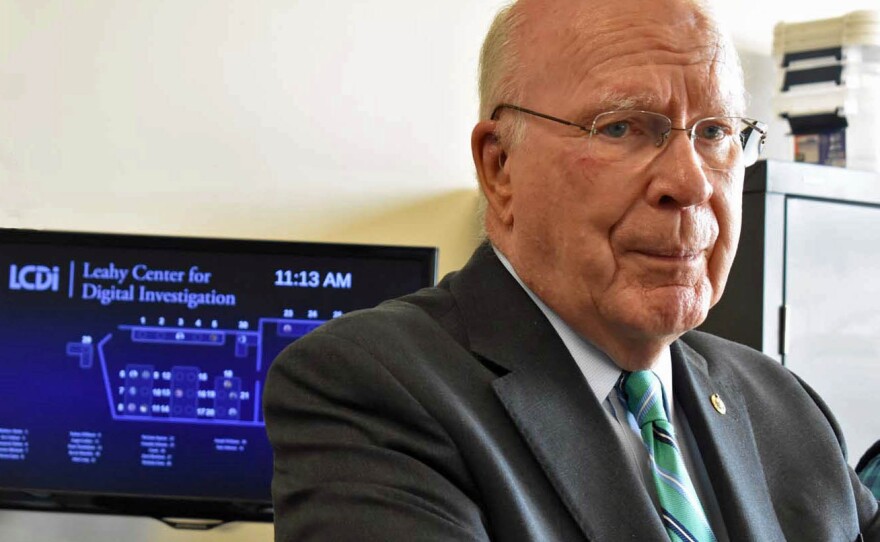In 2015, Champlain College won SC Magazine’s award for the Best Cybersecurity Higher Education program in the nation. The Leahy Center for Digital Investigation was created in 2010 as a professional digital forensics and cybersecurity lab, allowing students to work with the public and private sector. U.S. Senator Patrick Leahy toured the facility this week.
On the third floor of a Champlain College building several blocks south of downtown Burlington, a room is filled with students monitoring data at computer screens. Officials from the college’s Center for Digital Investigation meet Democratic Vermont Senator Patrick Leahy in the lobby and Interdigital forensics senior Amanda Johnson guides the group into the center where more than 100 students work. “We have three different sort of work spaces that we’re working in right now. We have our internship program which is aimed towards first-year students to come through. After you complete the internship here you can move on to our research and development areas where we have various different projects with relevant work experience sort of acclimating with new and emerging technologies.”
Leahy: “Give me an example of one of the projects.”
Johnson: “So an example we actually have our wearable technology project. We do Internet of Things or IOT. So there’s all kinds of different realms. We’re actually going to have a couple students talk about their projects to you today. If you want to come on in we going to have Nathan tell you a little bit about his project.”
This is Nathan DiMauro’s second semester at the digital center. “I’m on the wearables team along with three other students. So the main goal of our project is to create a detailed guide for forensic investigators and law enforcement agents to use to find certain artifacts on these 21st Century devices. And the kind of artifacts we’re looking for are things like stress level at a certain time or their heart rate during a certain time or like what I have on the screen here is a log of like text messages that they’ve been sending from the devices. So that you can use this to prove like, this is a time stamp right here, so you can use that to prove that they were sending these messages at these certain times and you can use it as evidence in a case like that.”
Leahy: “This is a little bit different than when I was state’s attorney.”
Johnson: “So this is Dylan Francis He’s also a senior. So Dylan’s going to talk to you a little bit about our research with Internet of Things.”
Francis: “So it’s a really neat project just because IOT’s growing every single day. It’s not just your desktop computer anymore. It’s everything from your microwave, your coffeemaker and so it’s one of those things because there’s you know billions of devices coming on every single day. We found it was a very big need for the lab to do. So we’ve actually created this IOT wiki. We have about 30 devices on here right now and we’re still putting some on as we go. So like we have the Lutron Maestro which is like a smart switch. So a light switch you think is kind of harmless but it actually has personal information about you, when you’re in the home, who turned on the lights, who turned off the lights. Different information like that.”
Beyond these workstations is a password protected door that leads to a more secure sanctum where the advanced team works.
Johnson: “This room actually has an additional layer of security. That’s probably to do because we actually store evidence back here for some of the cases that we work on. So this is our forensics area. So you’ll see that there’s a bunch of fancy tv’s on the wall here as well. I actually have Zach here who’s one of our security analysts who’s going to explain it.”
Zach Burnham: “This is our security operations center and up here we have dashboards that show just an overview of some networks that we monitor. They basically show different security aspects of different networks. This is usually used for us to catch our eyes to something that might be happening. A lot of them tell us different stories like this tells us basically system activity.”
Center Director Jonathan Rajewski: “We want justice, we want to figure out what’s going on with a case. Digital evidence is everywhere. It’s involved in just about every case now and it’s important to have the right tools, technology and people who can quickly respond.”
Senator Leahy is scheduled to announce three cybersecurity grant initiatives at Norwich University in Northfield, Vermont on Thursday.












